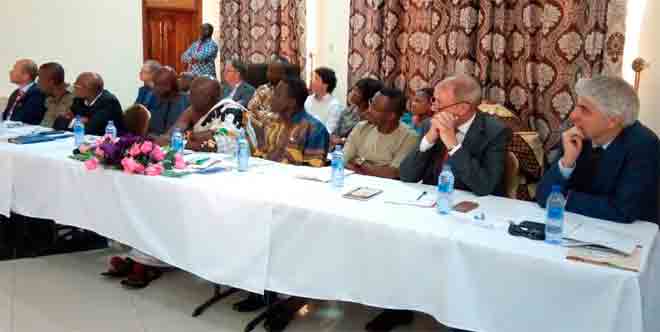
MMDAs charged to improve internal revenue generation
The Minister of Finance, Mr Ken Ofori-Atta, has underscored the need for the metropolitan municipal and district assemblies (MMDAs) to strengthen their internal resource generation strategies and improve tax collection, to avoid being dependent on the Consolidated Fund.
He said they should be able to sustain investments in health, education and infrastructural development to complement government’s effort to provide the enabling environment for the private sector to thrive and sustain economic growth.
The minister said this in a speech read on his behalf at the launch of the Tax Revenue for Economic Enhancement (TREE) Project on the theme: “Stronger Institutions for Ghana’s Future Beyond Aid”, in Cape Coast yesterday
Increased sustainability
The project seeks to increase the sustainability of Internally Generated Fund (IGF) to improve the delivery of basic services to citizens.
The TREE will be carried out from 2017 to 2021 in 32 selected MMDAs from the Central, Ashanti and Western regions.
Mr Ofori-Atta said the project had come at an opportune time to help increase revenue generation at the MMDA level and reduce pressure on the Consolidated Fund.
He said new technologies, known as the taxman software, would be deployed to help overcome common revenue administration challenges in the country.
Gains
The minister said this year, the government intended to consolidate the gains made in 2017 and had outlined ambitious targets in the budget.
Those targets will, however, remain a mirage if “we continue to hear stories of dissipation of public funds at the MMDA level that had become a common place during hearings of the Public Accounts Committee,” he added.
Mr Ofori-Atta, therefore, urged the MMDAs to take cognisance of the current reforms in the management of public funds and adhere to measures that had been instituted to ensure that public funds were not misappropriated or misapplied.
Citizens participation
A Deputy Minister of Local Government and rural Development, Mr Kwasi Boateng Adjei, emphasised the need for extreme citizens’ participation in local governance and, for that matter, revenue mobilisation.
He reminded the MMDAs of the Local Government Act, which enjoins them as the only institution to levy rates for a district, despite any customary law to the contrary.
“However, it is worth nothing that the Act, on the other hand, also finds it prudent for the Ministry to regulate the fees charged in order to ensure uniformity in the rates and also discourage the issuance of outrageous fees,” he cautioned.
The Head of Local Government Service, Dr Nana Ato Arthur, expressed the delight that the project focused on the property rate, the business operating permit and the building permit.
Revenue mobilisation
The Dutch Ambassador to Ghana, Mr Ron Strikker, said effective and efficient revenue mobilisation was the surest way of eliminating dependency.
He said the over-reliance of the MMDAs on the central government contributed largely to the low revenue generation in most MMDAs.
He pledged his country’s support to the project saying “we think it would improve the internally generated funds of the MMDAs”.
